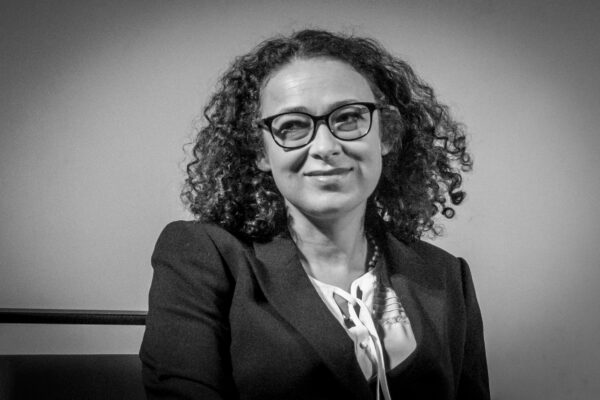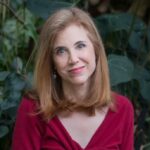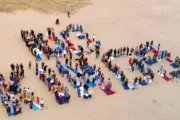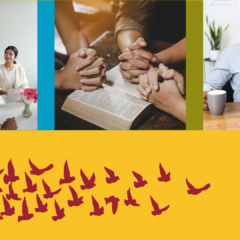This article was originally published by the New York Times, with the support of CRCC’s global project on engaged spirituality.
Rabbi Delphine Horvilleur thinks a lot about death.
In years past, she would typically stop by a cafe for a double espresso after officiating at a funeral. “I couldn’t go straight back to my children without creating a separation,” she said. “In Judaism there are folk tales that suggest the Angel of Death is following us. I didn’t want to bring death home.”
Then came the pandemic. “Suddenly,” she said, “we were in a moment of vulnerability, when life and death held hands.”
She found herself conducting funerals over Zoom while her two youngest children watched cartoons in the next room. Afterward, she would wash her hands and open the windows as if to release the sorrow.
Yet, the coronavirus lockdown in Paris coincided with Passover, which gave her the idea of beginning weekly talks on Zoom about Jewish texts.
“It was quite striking to me that we were talking about freedom from slavery and getting out of Egypt when we were stuck in our houses with the Angel of Death all around us,” she said. Ancient Jewish wisdom, she believed, could offer a “pillar of strength” to people suffering loneliness and loss.
The talks became a sensation on social media, and soon began drawing thousands of Jews, Muslims, Christians, believers and nonbelievers. In 2020, Rabbi Horvilleur appeared on the cover of French Elle wearing a blazer and jeans.
“She is my rabbi,” said Edith Gillet, 49, a French atheist with a Catholic grandmother and no plans to convert. “I got hooked on her because she’s so inspirational in such dark times,” added Ms. Gillet, who watches Rabbi Horvilleur on social media from her home in Davis, Calif. “I’m drawn more to her philosophy than to any notion of God.”
The rabbi often asks herself why she is so preoccupied with death, and attributes it to officiating at least two funerals a week and being a grandchild of Holocaust survivors.
“I was brought into the world with an unspoken knowledge of tragedy,” she said. “I was clearly aware even as a child that ghosts haunted my life. Often, I walk in cemeteries and wonder what I’m looking for. I think I am trying to attend funerals that never took place. It is definitely haunting that the Shoah left us with millions of unburied souls, and it should continue to haunt all of us.”
Today, she gives weekly talks on Talmud and Jewish mysticism in a theater filled to its 400-seat capacity, with the audience including, she says, psychoanalysts and film directors. “They understand the power of storytelling to change lives.”
She edits a quarterly magazine, Tenou’a, or “movement,” on religion and art. A fictional TV series based on her life is in production.
Her book, “Living With Our Dead,” has sold more than 250,000 copies, a rarity for a nonfiction hardcover in France. It is scheduled to be released in paperback in September, with an English edition coming next year.
A reflection on one’s relationship to death, it tells the stories of 11 public and private figures who inspired her, among them Elsa Cayat, a Jewish psychoanalyst killed in the 2015 terrorist attack at the office of the satirical magazine, Charlie Hebdo. She also writes of a dear friend she refers to only as “Ariane,” who died of a brain tumor.
At the end of her life, Ariane was no longer conscious, Rabbi Horvilleur wrote. “But we were there to witness the moment the doors opened. It felt like thousands of people had gathered around us: ancestors, guides, weeping Jewish mothers and children who will one day need to be told this story.”
At 47, with a wild mane of dark hair, Rabbi Horvilleur did not plan on becoming a rabbi, at least not at first.
Born in Nancy, France, her father was a family physician and her mother an economics professor. Both of them, she says, cared more about Jewish culture than observance.
After graduating from high school at 17, she moved to Jerusalem to study medicine at Hebrew University. While there, she began to study the Talmud and “fell in love with the sacred art of interpreting ancient texts.” Later, she relocated to New York to attend the Reform movement’s Hebrew Union College to become a rabbi.
One of only five female rabbis in France, she considers herself a storyteller who mines biblical narratives for modern meaning. In a country committed to laïcité, or secularism, she is the rare intellectual to bring religious texts into the public square.
She also calls for a plurality of religious voices in interpreting holy texts and has co-written a book on Islam and Judaism with a liberal Muslim scholar, Rachid Benzine.
“I try to build bridges between worlds that have stopped talking to each other,” she said. “Some people will use this moment to create ideologies that demonize people. But what is the meaning of my life if confinement makes me blind to the other?”
The rabbi never cries at funerals. “I have to show something remains standing when people are devastated,” she said over coffee and chocolate in her sunny, sparsely furnished Parisian loft. She is dressed in a black T-shirt and jeans, her only jewelry a bracelet that spells out “happy” in white beads, a present from her 9-year-old daughter. On bookshelves and tables sit some 70 menorahs, a gift from a Protestant stranger who collected them while traveling.
Were it not for the pandemic, Rabbi Horvilleur’s words might well have stayed within her liberal Jewish congregation of 1,200 in Paris. In France, notes Yonathan Arfi, president of a council representing 75 French Jewish institutions, the vast majority of France’s estimated 600,000 Jews identify as Orthodox.
The rabbi is something of a paradox, Olivier Nora, president of Editions Grasset, which published her book on death as well as an earlier work, “Reflections on the Question of Antisemitism,” said. “First you see this charming, extremely intelligent, very good-looking and interesting person. She appears joyful, but she seems to carry a lot of melancholy,” he said. “She’s healing the suffering of a lot of families in France.”
Rabbi Horvilleur describes her own story using the root of the Hebrew word for wisdom, binah, or in between. Her paternal family came to France centuries ago. “They were saved by the righteous during the war and were grateful to the French nation,” she said. Her mother’s parents were Czech Holocaust survivors who told her to stay away from non-Jews for fear they might kill again. “This led to my desperate attempts to create links between irreconcilable universes,” she said.
She understands God the way the Jewish mystics do: as infinite, distant and impossible to describe. “I believe in transcendence, in sacredness. So often I witness fascinating signs or mystical manifestations, and I’m free to interpret them,” she said.
Humor, she believes, is central to interpretation. “What could be more absurd than 89-year-old Sarah, wife of Abraham in the Bible, having a baby?” she pointed out.
And laughter, she said, has a place at funerals. When she presided at the Paris burial of a Frenchman who had lived in Florida, his ornate coffin was too large to fit in the hole in the ground. “We started to laugh about the typical French caricature of Americans. Their cars are too big. Even their caskets are double-sized,” she said.
When discussing political strife, from rising anti-Semitism to the erosion of women’s rights, Rabbi Horvilleur again turns to Hebrew. American Jewry, she says, mistranslates the Jewish concept Tikkun Olam to mean repairing the world.
“Resilience only comes from acknowledging that what is broken won’t be repaired. It’s always about knowing how you are going to bring together the shattered pieces of your life to create a stronger story for times of despair. A wonderful word in modern Hebrew is mashber, or crisis. Originally, it meant birthing tool.”
We are in a time of mashber, she said. “It’s a time of anger and hope, death and life. It’s the birthing of something new and no one knows what that’s going to be.”
Click here to read the story on the New York Times.
Photo By Claude Truong-Ngoc / Wikimedia Commons
Julia Lieblich is a journalist fellow with the Spiritual Exemplars Project.








